This is the overflow of writing from my last post — the point of intersection where revelation, death, and searching meet the virtues of a society with an abundance of people who love themselves more than anything else. Part II of gathering up what has unraveled. It is long, but consider it an act of defiance against our time- and attention-deficit world.
I bought a telephone.
It’s an American Telecommunications Corp (ATC) Genie, manufactured in El Monte, California, in the 1970s. It has a lovely, smooth aqua exterior with white push-button numbers framed with a gold-toned dial. Art — the kind of beauty found in those old-fashioned everyday things that Andy Warhol would capture in large-scale prints.
The receiver sounds a faint click when it’s picked up. It has heft — not heavy, but weighty and solid — betraying the plastic exterior with something more substantial inside. It would survive a fumbled drop on the floor or a slam into the cradle from a heated disagreement (pity the poor soul on the other end who can do nothing but push “END” with a sternly erect finger).
Hold it up to your ear and listen: a dial tone. The steady, tender electric hum — a prompt — waiting for a human to call the outside world. It’s how you know there is an outside world, that things are functioning, that the whirls and spinning of the earth on its axis are assuredly there and waiting for you to make a move. Take a chance, the path is clear.
Ten numbers pressed on the small dial. No “Contacts” list, no pushing the picture of someone’s face. This is scouring your memory or examining the number scrawled on a scrap of paper or the back of an envelope — smoothing out the paper and squinting, “Is that an eight or…a five???” Take a chance on five. Nope, “Sorry! Wrong number.” Try again, press eight this time.
I have the phone because I thought it would help fix what I thought was broken in the world.
It didn’t fix anything. Not that a phone could, or I even know what needs fixing. All I know is that something is broken.
I keep returning to this: Why go along with a world that isn't real, that is contrived bullshit? The question is no longer if the center will hold — it will not, it has not — but how to sincerely coexist in an insincere world. What choice must be made? To know what to fight for or what we are fighting?
20th-century novelist and essayist Walker Percy writes in The Moviegoer, “In this world goodness is destined to be defeated. But a man must go down fighting. That is the victory. To do anything less is to be less than a man.”
Despair in the world happens when the people we relied on to believe stopped believing.
I am what happens when I still want to believe in a world that stopped being.
A person on the eve of destruction.
We are not a nation that lost its innocence; we are a nation that lost its belief even in its own myth. It’s not that we killed it, we pretended something that we needed wasn’t there and substituted love for God and Country not for some other Great Thing, but the absolute smallest thing: ourselves. And when you are aware that what you are doing is wrong but approaching that lifestyle as an inevitability because of Progress or Modernity or the Very Smart People chide the very dumb ones who believe in such hookery (and who want to be the last naive little child to believe in Santa Clause or the Tooth Fairy?), but you engage it in anyway it eventually makes you bitter and hateful. It sucks the tenderness right out of your soul. Love is emptiness.
21st-century novelist and essayist David Foster Wallace writes in his 1996 novel Infinite Jest:
It’s of some interest that the lively arts of the millennial U.S.A. treat anhedonia and internal emptiness as hip and cool. It’s maybe the vestiges of the Romantic glorification of Weltschmerz, which means world weariness or hip ennui. Maybe it’s the fact that most of the arts here are produced by world-weary and sophisticated older people and then consumed by younger people who not only consume art but study it for clues on how to be cool, hip … We are shown how to fashion masks of ennui and jaded irony at a young age where the face is fictile enough to assume the shape of whatever it wears. And then it’s stuck there, the weary cynicism that saves us from gooey sentiment and unsophisticated naiveté … That queerly persistent U.S. myth that cynicism and naiveté are mutually exclusive. Hal, who’s empty but not dumb, theorizes privately that what passes for hip cynical transcendence of sentiment is really some kind of fear of being really human, since to be really human (at least as he conceptualizes it) is probably to be unavoidably sentimental and naive and goo-prone and generally pathetic, is to be in some basic interior way forever infantile, some sort of not-quite-right-looking infant dragging itself anaclitically around the map, with big wet eyes and froggy-soft skin, huge skull, gooey drool. One of the really American things about Hal, probably, is the way he despises what it is he’s really lonely for: this hideous internal self, incontinent of sentiment and need, that pulses and writhes just under the hip empty mask, anhedonia.
Wallace, who killed himself in 2008 at the age of 46, was a contemporary voice of a generation steeped in cynicism, irony, and nothingness treading a steady, glazed-over path to purposelessness and aimlessness. A writer who fits perfectly between Walker Percy, diagnosing the cause of our malaise, and the inevitability of the 21st-century Lost Generation. If Percy wrote about the ex-suicide and plainly contrasted a man perpetually searching inward for meaning, Wallace fulfilled the prophecy.
In his 2022 profile of Wallace for the New Yorker, Jon Baskin writes,
Wallace’s great subject was the morass of selfishness, self-rationalization, and intellectualized narcissism into which his cohort of educated, relatively privileged Americans would sink — and were sinking — unless they could find something to love more than they loved themselves. A difference between Wallace and many of his contemporaries—one that sometimes opened him to charges of hypocrisy and self-delusion, not to mention cringeworthy sentimentalism—was his commitment to doing more than merely cataloguing the traps of modern alienation. This did not mean that he claimed to have escaped those traps himself. It did mean, as reflected by his attraction to conversion narratives like Fogle’s, that he hoped he could spring his readers free.
What does it mean to be free?
Wallace writes in his last (unfinished) novel The Pale King, “I didn’t stand for anything. If I wanted to matter —even just to myself — I would have to be less free, by deciding to choose in some kind of definite way.”
Choosing it.
There is only one life I can choose to create away from all of this. It is the only way.
We’re left with a past broken by the present and now we stand in the looming shadow of our future — swallowed up by it as if it were Death himself counting the moments before the dystopian hellscape we thought was the exclusive property of science fiction paperbacks and PG-13 movies becomes our reality.
In our world, the thrill of outrage dissipates and what remains is the mundane and mind-numbing — the endless scroll of fingers pointing and wagging — what then? How do you find brilliant streaks of technicolor in a world suffocating from monochrome misery?
This: The Drifters and the Flamingos, Sam Cooke, Percy Sledge, The Moonglows. It's dancing close, holding onto each other tight, soft kisses under a dim light and starry eyes. It's the comfort of a longing gaze and moon swept dew. Chiffon dresses and polished shoes. John Wayne, Artie Shaw, and Grace Kelly. Humphrey Bogart rebuffing Ingrid Bergman’s searching, pleading eyes. Dancing the Stroll to the jukebox’s echoes. Gershwin’s romance, Sinatra’s crooning, and a soldier’s goodbye. Midwest church basement potlucks and California Big Band dinner clubs. A new record on the turntable and an old truck on a dirt road.
Believe in the myths. Believe in Heroes. Believe in the thing that is greater than yourself.
David Foster Wallace was a hyper-intelligent depressive. A troubled soul in a troubled world trying to make sense of both. In the end, he couldn’t save either, but not for lack of trying. In 2000,Wallace profiled the late Sen. John McCain for Rolling Stone magazine, briefly traveling on the campaign trail with the late presidential candidate. He gets to the phoniness, prefabricated political bullshit and shines pure antiseptic light. Pimpmobiles, brain-melting hysterics, cellphones, clunky cameras, teeth-gnawed pencils, manicures, and Starbursts. Honor, honesty, authenticity, and humanity. And at the center is one man who could have been. Who was. Millions saw him as a leader of men, shapers of dreams — the American Dream — and torchbearer of heroes & heroics.
Wallace bookends the piece between these two paragraphs:
That he chose to spend four more years there, in a dark box, alone, tapping code on the walls to the others, rather than violate a Code. Maybe he was nuts. But the point is that with McCain it feels like we know, for a proven fact, that he’s capable of devotion to something other, more, than his own self-interest. So that when he says the line in speeches in early February you can feel like maybe it isn’t just more candidate bullshit, that with this guy it’s maybe the truth. Or maybe both the truth and bullshit: the guy does – did – want your vote, after all. But that moment in the Hoa Lo office in ’68 – right before he refused, with all his basic normal human self-interest howling at him – that moment is hard to blow off. All week, all through MI and SC and all the tedium and cynicism and paradox of the campaign, that moment seems to underlie McCain’s “greater than self-interest” line, moor it, give it a weird sort of reverb that’s hard to ignore. The fact is that John McCain is a genuine hero of the only kind Vietnam now has to offer, a hero not because of what he did but because of what he suffered – voluntarily, for a Code. This gives him the moral authority both to utter lines about causes beyond self-interest and to expect us, even in this age of Spin and lawyerly cunning, to believe he means them. Literally: “moral authority,” that old cliche, much like so many other cliche’s – “service,” “honor,” “duty,” “patriotism” – that have become just mostly words now, slogans invoked by men in nice suits who want something from us.
…
But if you, like poor old Rolling Stone, have come to a point on the Trail where you’ve started fearing your own cynicism almost as much as you fear your own credulity and the salesmen who feed on it, you may find your thoughts returning again and again to a certain dark and box-sized cell in a certain Hilton half a world and three careers away, to the torture and fear and offer of release and a certain Young Voter named McCain’s refusal to violate a Code. There were no techs’ cameras in that box, no aides or consultants, no paradoxes or gray areas; nothing to sell. There was just one guy and whatever in his character sustained him. This is a huge deal. In your mind, that Hoa Lo box becomes sort of a special dressing room with a star on the door, the private place behind the stage where one imagines “the real John McCain” still lives. And but now the paradox here is that this box that makes McCain “real” is, by definition, locked. Impenetrable. Nobody gets in or out. This is huge, too; you should keep it in mind. It is why, however many behind-the-scenes pencils get put on the case, a “profile” of John McCain is going to be just that: one side, exterior, split and diffracted by so many lenses there’s way more than one man to see. Salesman or leader or neither or both, the final paradox — the really tiny central one, way down deep inside all the other campaign puzzles’ spinning boxes and squares that layer McCain — is that whether he’s truly “for real” now depends less on what is in his heart than on what might be in yours.
There has to be a rediscovery of meaning in words and action. We're starving for it because all we're given are platitudes and empty promises. We're angry at everything and shocked at nothing.
"Follow your heart," writes John Bunyan in The Pilgrim's Progress.
Somewhere in between the hard things and the courage to do them is where hope and despair battle in the heart of men. And we are divided between those who will join the battle and those who act as if it doesn't exist. Life is discovered in the silent, tender moments. It's in regrets and poor decisions. Every day. Light and dark, all at once, blinding and illuminating. I cannot know the difference anymore. Someday it will be revealed to me, and I will see light and dark and understand them both.
"This is a generation that has an inheritance of absolutely nothing as far as meaningful moral values, and it's our job to make them up,” writes Wallace. "It manifests itself as a kind of lostness." I've been betrayed before and will again — not by what I believed, but what I hoped: that I could spark a fire; that a Person would call with the news I longed to hear; that I would be something; that I would be enough. But it was all stories that had to unravel. To paraphrase Joan Didion, stories I told myself, "In order to live." And they did unravel. And now I must start a new life, a new path.
The past doesn't change anything. It doesn't change us. It doesn't change love or belonging to your sweetheart or having a heart to call your own, forever. It's defending her honor and fighting for his reputation. Saturday night dancing and everyday whispers between you and your love. Longing looks at the universe spread among the stars and sunsets reflected in hazy eyes.
Do this because the world is falling apart. It is in ruins. But the world was falling apart yesterday and it will be falling apart tomorrow. It did for Hemingway and Fitzgerald, Bellow and Amis, Salinger and Plath, and O’Connor, Walker, and Wallace. What did they do? They stood in the maelstrom, and they wrote. They wrote about despair and anguish and searching for meaning and the meaninglessness of it all. They wrote about us.
They wrote about losing themselves to an impossible world and how to exist in it. How we cannot stop change — if anything ever truly changes — but not to be changed by it.
Is it the falling apart, the center not holding, the brokenness, and belief seeping through the broken parts? Many people look frantically for somewhere to belong. They choose the mob, the cynics, the unbelievers. There is another choice: stand apart from it. Pick up the phone and hear the hum. Believe in our myths. The writers tried to tell us about the condition of the world, of our time, and of us. They transcended the petty lies and slogans and tried to deliver purity, love. It drove them closer to wisdom, madness, and death.
I wonder what they saw in a world falling apart, over and over. They could have walked away. We all have that choice. Tenderness or bitterness. Forgiveness or grievance. Love or fear. We can choose to search for what they saw — to see life untouched by it and not participate in the hysteria. See the world as it could be.
David Foster Wallace’s widow, Karen Green, recalled in an interview with The Guardian some years after her husband killed himself,
[Interviewer]: Wallace often seemed so desperate to protect himself from the world, I wonder if he'd experienced death or loss close up at any point?
Green shakes her head: "No – his grandfather, his aunt – but no. He couldn't bear the idea of the dogs dying. And he used to say to me all the time, at night: 'Don't die.'" She pauses for a long time. "That's a hard thing to think about," she says. "It is hard to remember tender things tenderly."
I must choose. And here is the thing, whether it was a revelation or epiphany that came to me as I drove over that hill and saw the sky backlit by the sun’s sunken fire, I made a choice.
I choose love. Love in the thrill and passion, in the fighting and in despair. Love found by dredging the black depths of the heart that has been locked up like an unspeakable secret, screaming to escape.
Love for Beauty, Truth, and the Goodness that rises from the ragged trials of brutal grace. Love that's tender, fragile, and warming as the sun on the feathers of a windswept bird. It's always been there. It's waiting for us.
“What needs to be discharged is the intolerable tenderness of the past, the past gone and grieved over and never made sense of. Music ransoms us from the past, declares an amnesty, brackets and sets aside the old puzzles. Sing a new song. Start a new life, get a girl, look into her shadowy eyes, smile.” ― Walker Percy, Love in the Ruins
Revive love. Believe in the myths. Create the world you want to live in and choose to be the person who upholds the Code.
Wallace writes, “What’s unendurable is what his own head could make of it all. But he could choose not to listen.”
Deep down we all know the Truth. We want to gaze into the warm kiln of Beauty and let it form us. We know what Goodness is. The only thing to do is listen for the dial tone.
The choice is yours. Sincerely, Jenna

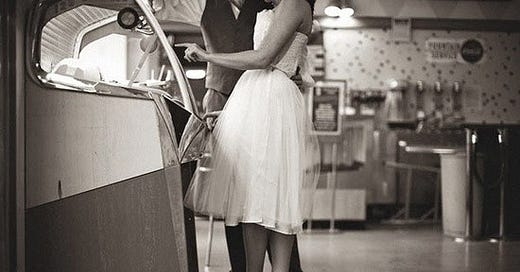



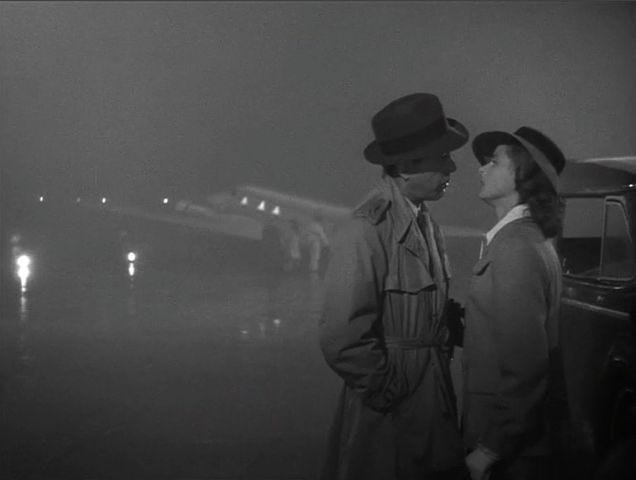
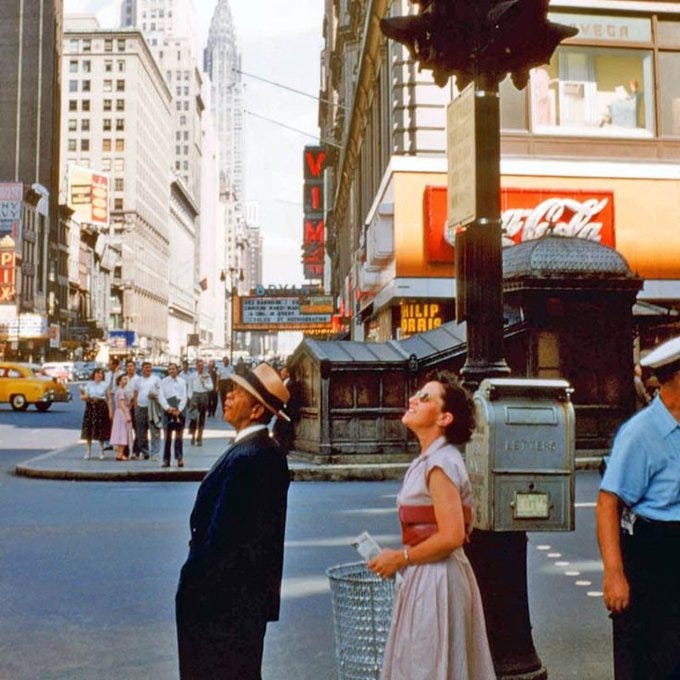
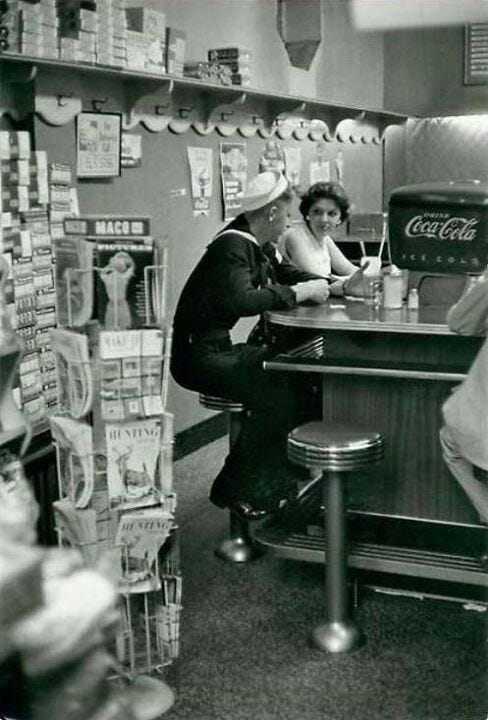

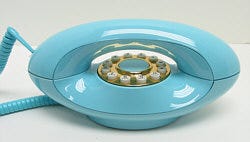
I think it was James Joyce that said the correct mood for life is a gentle melancholy. It allows us to love beauty, goodness and the things of the past, to work to make things better, and to put our hope and faith in God. The trick is to keep clear of the clutches of acedia. Looks like Jenna Stocker is in this sweet spot.
Keep thinking deeply, enduring pain and never give an inch to despair!
...and more posts please.
Perfect post!